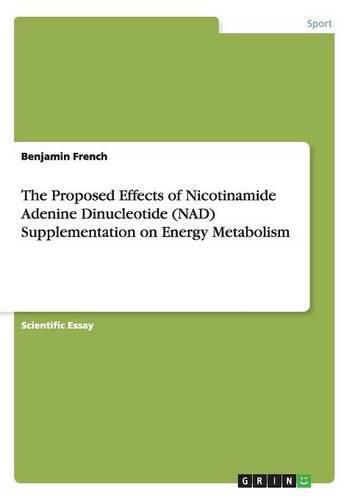Readings Newsletter
Become a Readings Member to make your shopping experience even easier.
Sign in or sign up for free!
You’re not far away from qualifying for FREE standard shipping within Australia
You’ve qualified for FREE standard shipping within Australia
The cart is loading…






Scientific Essay from the year 2008 in the subject Sport - Sport Medicine, Therapy, Prevention, Nutrition, Loughborough University, course: Sport and Exercise Science, language: English, abstract: Energy metabolism is a process that is essential in the maintenance of life and has obvious roles with regards to sporting performance. Oxygen’s role in aerobic respiration is to act as the final hydrogen/electron accepter to form water. If oxygen is not present the whole aerobic pathway cannot occur and so the body will rely on energy produced anaerobically. The question instantly raised is to whether oxygen is ever in short supply, does it become a limiting factor for energy metabolism? The body will adapt to training in a variety of manners so that only under extreme conditions is oxygen a limiting factor. All of these adaptations are beneficial from an exercise performance standpoint and increase the efficiency of the complex metabolic process. There are still however questions surrounding the idea that NAD+ plays a key role in this process and whether increasing the synthesis/concentration would be advantageous for the trained individual. Nicotinamide, nicotinic acid, tryptophan and nicotinamide riboside are all natural substances that are acquired in the diet. Due to the protein and other biosynthetic uses of tryptophan it may not be as efficient or indeed practical to use tryptophan as a supplement. Supplementation of nicotinamide and nicotinic acid appears to increase NAD+ biosynthesis and the intracellular NAD+ pool. Whether these effects can aid in sporting performance is currently unanswered with no research in this area.
$9.00 standard shipping within Australia
FREE standard shipping within Australia for orders over $100.00
Express & International shipping calculated at checkout
Scientific Essay from the year 2008 in the subject Sport - Sport Medicine, Therapy, Prevention, Nutrition, Loughborough University, course: Sport and Exercise Science, language: English, abstract: Energy metabolism is a process that is essential in the maintenance of life and has obvious roles with regards to sporting performance. Oxygen’s role in aerobic respiration is to act as the final hydrogen/electron accepter to form water. If oxygen is not present the whole aerobic pathway cannot occur and so the body will rely on energy produced anaerobically. The question instantly raised is to whether oxygen is ever in short supply, does it become a limiting factor for energy metabolism? The body will adapt to training in a variety of manners so that only under extreme conditions is oxygen a limiting factor. All of these adaptations are beneficial from an exercise performance standpoint and increase the efficiency of the complex metabolic process. There are still however questions surrounding the idea that NAD+ plays a key role in this process and whether increasing the synthesis/concentration would be advantageous for the trained individual. Nicotinamide, nicotinic acid, tryptophan and nicotinamide riboside are all natural substances that are acquired in the diet. Due to the protein and other biosynthetic uses of tryptophan it may not be as efficient or indeed practical to use tryptophan as a supplement. Supplementation of nicotinamide and nicotinic acid appears to increase NAD+ biosynthesis and the intracellular NAD+ pool. Whether these effects can aid in sporting performance is currently unanswered with no research in this area.